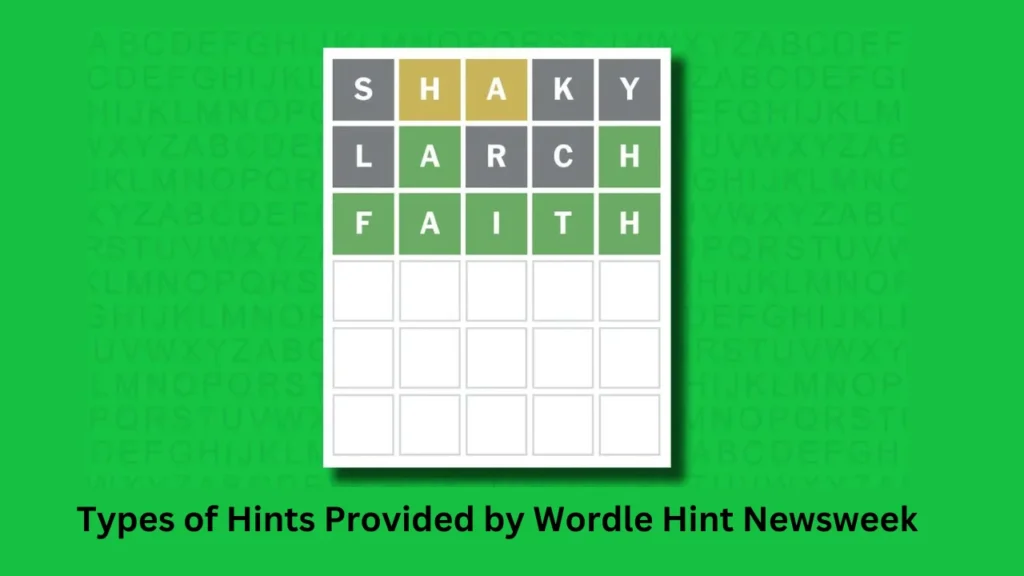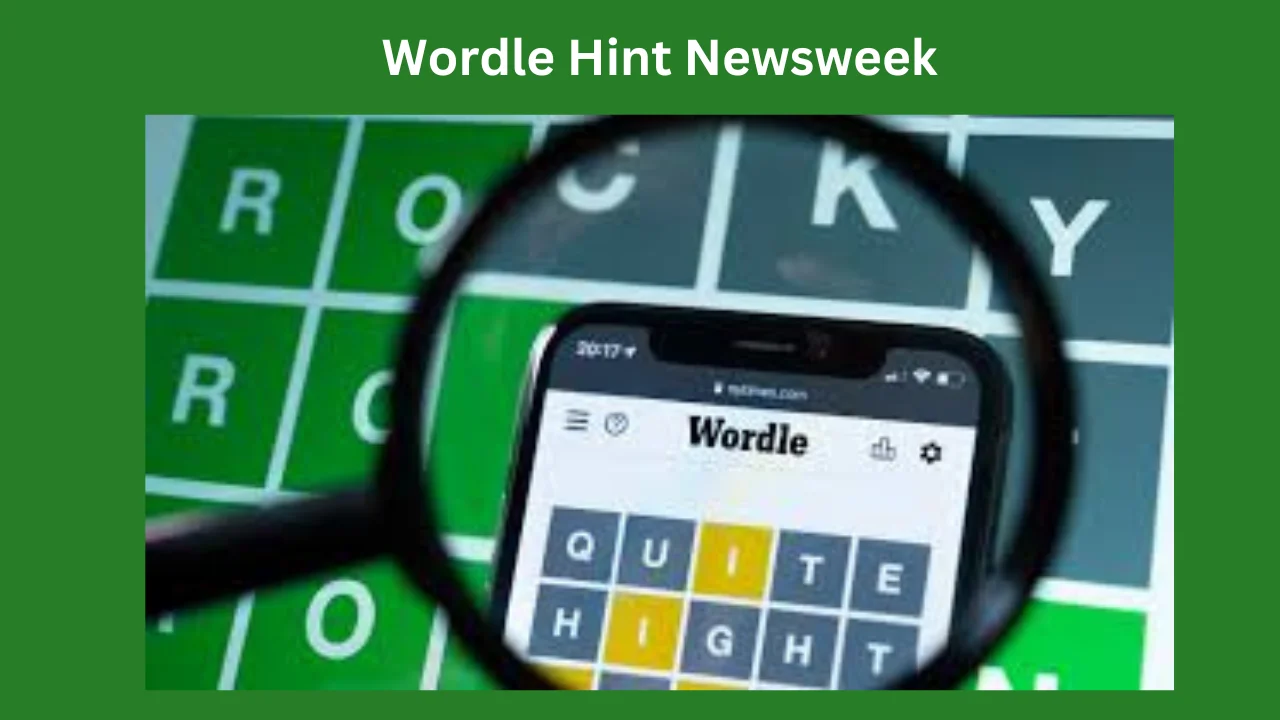If you’re a fan of word games, you’ve likely heard of Wordle, the puzzle that has taken the internet by storm. Players are tasked with guessing a five-letter word in six tries or less. Each guess provides clues in the form of color-coded tiles, helping narrow down the possibilities. It’s simple, yet incredibly addictive! However, as fun as Wordle is, it can also be challenging, which is why Wordle hint Newsweek articles have become popular resources for players who need a little extra help.
In this article, we’ll explore how to use Wordle hints effectively, discuss what you can expect from Wordle hint Newsweek posts, and share tips for improving your Wordle strategy. By the end, you’ll be solving Wordle puzzles like a pro!
What is wordle hint newsweek
Wordle hint Newsweek refers to the daily articles or posts published by Newsweek that provide clues and hints for the popular word puzzle game, Wordle. These hints are designed to help players who might be stuck on a specific puzzle, offering subtle clues without directly revealing the answer. The hints often focus on common letters, vowel placement, or word structure, making them a helpful resource for players who want a little nudge in the right direction without spoiling the challenge of solving the puzzle themselves.
What is Wordle
Wordle is a browser-based word puzzle game where players must guess a secret five-letter word within six attempts. After each guess, the letters are highlighted in different colors:
Green indicates that the letter is in the correct position.
Yellow means the letter is in the word but in the wrong spot.
Gray suggests the letter isn’t in the word at all.
This color-coding provides essential feedback, helping players refine their guesses until they (hopefully) discover the correct word. As the game offers a new word every day, many players turn to resources like to gain valuable insights or hints for particularly tricky words.
Why Use Wordle Hint Newsweek
For those who don’t want the answer outright but need a little nudge in the right direction, is the perfect resource. It offers clues that help narrow down possibilities without giving the solution away. These hints provide just enough information for players to rethink their strategy and make informed guesses.
For example, a typical post might suggest focusing on vowel-heavy words or common letter patterns. This type of advice is perfect for when you’re stuck after a few guesses but want to avoid spoiling the fun by looking up the answer.
Types of Hints Provided by Wordle Hint Newsweek

Each day, delivers helpful clues tailored to that day’s puzzle. Here are some of the most common types of hints you’ll find:
General Word Structure Hints:
These hints may focus on how many vowels or consonants are in the word. This can significantly narrow down your guesses.
Letter Positioning:
Sometimes, hints might give subtle clues about where certain letters should or should not be placed.
Thematic Clues:
Occasionally, hints may suggest a theme for the word of the day. For example, it could be related to a holiday or a seasonal event.
The beauty of these clues is that they maintain the integrity of the puzzle. You still get the satisfaction of solving the puzzle yourself, but with just a bit of assistance to get you on the right track.
How to Use Wordle Hint Newsweek Effectively
Knowing when and how to use hints can improve your Wordle-solving skills. Here’s how you can get the most out of the clues:
Use Early Hints to Narrow Down Vowels:
Vowels are often the backbone of a word. If Newsweek hints suggest a certain number of vowels or highlight common vowel placements, this can help reduce your options dramatically. For instance, if a hint mentions that the word has two vowels, you can focus your next guess around vowel-heavy possibilities.
Consider Letter Frequency:
Wordle hint Newsweek posts often remind players of common letters in the English language (like “E,” “R,” or “T”). Use these letters early on to maximize the feedback from each guess.
Look for Letter Placement Tips:
Some hints focus on where specific letters might be located within the word. If Newsweek hints suggest that certain letters belong at the beginning or end of the word, you can immediately cut down potential guesses.
Play Smart, Not Fast:
Don’t rush through your guesses. Take a moment after each one to evaluate the feedback. It encourages strategic thinking, using each clue to make an educated guess, rather than just typing random words.
| Guess # | Letters Used | Feedback Received | Adjusted Guessing Strategy |
|---|---|---|---|
| 1 | TRAIN | 1 green, 1 yellow | Focus on moving yellow letter and replacing gray ones |
| 2 | GRAPE | 2 green, 0 yellow | Lock in green letters, avoid gray |
| 3 | CRANE | 4 green, 0 yellow | Replace the last letter with possible options |
| 4 | CRANK | 5 green | Solved! |
Benefits of Using Wordle Hint Newsweek
There are several benefits to using to aid in solving your daily Wordle puzzles:
Improves Your Skill Over Time:
Regularly using hints sharpens your puzzle-solving skills, teaching you how to think strategically and recognize common word patterns.
Reduces Frustration:
While Wordle is a fun game, it can also be frustrating when you’re close to solving but can’t quite figure it out. Using hints prevents this frustration, letting you enjoy the game without getting stuck.
Keeps the Fun in the Game:
Some players avoid Wordle hint sites because they don’t want spoilers. But strikes the perfect balance between offering help and maintaining the challenge, ensuring you still feel accomplished when you solve the puzzle.
Wordle Tips and Tricks Beyond the Hints
While Wordle hint Newsweek provides invaluable clues, developing your own strategies can further improve your Wordle game. Here are some tips:
Start with Common Vowels and Consonants:
Words like “SLATE” or “CRANE” are great starting guesses since they cover common letters and provide good initial feedback.
Think About Letter Combinations:
Certain letter pairs, like “CH,” “TH,” or “SH,” frequently appear together. If you see green or yellow feedback, consider these pairs in your guesses.
Don’t Guess Words with Repeating Letters Early:
In the beginning, it’s best to avoid words that contain duplicate letters (e.g., “FOOLS”). These types of guesses are best saved for later in the game, once you’ve ruled out other possibilities.
Wrapping Up Your Wordle Game with Confidence
Whether you’re playing Wordle every day or just jumping in for a quick mental workout, using the Wordle hint Newsweek can enhance your experience. Not only do these hints offer just enough guidance to get you unstuck, but they also help you develop a more strategic approach to solving Wordle puzzles.
Next time you’re stumped, don’t hesitate to check out it for helpful clues that will point you in the right direction while keeping the game’s challenge intact. With these resources and tips, your Wordle skills are sure to improve in no time!
Frequently Asked Questions
What type of hints does Wordle Hint Newsweek provide?
It offers subtle clues about the daily Wordle puzzle, such as vowel placement, common letter combinations, or word structure to help guide players without revealing the answer.
Is Wordle Hint Newsweek free to use?
Yes, Wordle Hint Newsweek articles are available for free online, offering players helpful hints for solving their daily Wordle puzzles.
Does Wordle Hint Newsweek spoil the Wordle answer?
No, Wordle Hint Newsweek provides helpful hints without directly giving away the answer, allowing players to still enjoy the challenge of solving the puzzle themselves.
Conclusion
In conclusion, Wordle hint Newsweek serves as an excellent resource for players looking for a little guidance while maintaining the fun and challenge of solving Wordle puzzles. With its strategic hints, such as vowel placements or letter suggestions, it helps players refine their guesses without directly revealing the answer. Whether you’re a seasoned Wordle player or a beginner, these hints can improve your gameplay and reduce frustration, ensuring an enjoyable puzzle-solving experience every day.
